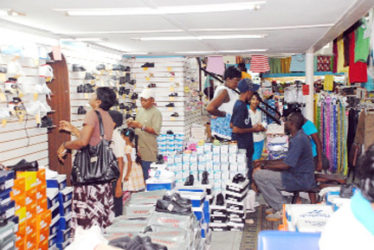Feedback from a recent visit to more than 70 business houses in Georgetown by officials of the Georgetown Chamber of Commerce and Industry (GCCI) points to a significant decline in urban commercial activity, newly elected President of the Georgetown Chamber of Commerce and Industry (GCCI) Deodat Indar has told the Stabroek Business.
Blaming the sluggishness of the business climate largely on reduced liquidity and a decline in “walk-in customers” – partly the result of the situation that had arisen out of the parking meter fiasco, Indar said the feedback received from the business houses engaged by the Chamber officials points to a decline in trading that ranges from 30% to 60%,
The disclosure by the new Chamber president follows months of wider private sector insistence that there has been a significant slowdown in economic activity, though he conceded that there was a need to support the anecdotal evidence with reliable statistical information.

And against the backdrop of assertions in some quarters that local business support organizations have lacked assertiveness in advocating the causes of their membership, Indar said that the chamber’s new leadership team will be seeking to make the body “a louder, firmer, more intelligent voice” for the business community.
In an interview on Wednesday, Indar told this newspaper that the new chamber executive will be placing “the protection of business” high on its agenda. “We have a job to do as advocates for the business community and we intend to do that job,” Indar said.
The changing of the guard at the helm of the GCCI coincides with what is widely considered to be an icy standoff between the public and private sectors, characterized by stark differences over the state of the economy and the issuance of public statements on both sides that match the prevailing mood of uneasiness. But in last Wednesday’s exchange with this newspaper Indar sought to emphasize the importance of government and the private sector working together, declaring that the new Chamber executive “will be working to help create an avenue, a process, that kicks in to deal with government, private sector grievances.”
The UK-trained business executive who serves as Company Secretary at Sterling Products Ltd, said that last Tuesday’s meeting between representatives of several private sector bodies including the chamber, the Private Sector Commission and the Guyana Manufacturing and Services Association (GMSA) entities, and a team from the Guyana Revenue Authority (GRA) to discuss a range of issues including taxes was an example of dialogue in an environment which can be described as “a step in the right direction.” He said that part of the focus of the GCCI would be on fashioning an enhanced environment within which discourse between government and the private sector on the broadest possible range of issues can proceed towards constructive outcomes.

Meanwhile, the new chamber president said that under the present executive the private sector body will be directing much more of its attention to seeking to determine how its members and the local business community as a whole can take full advantage of the supply chain that will result from the emergence of an oil and gas industry. “We believe that it is important that our members migrate to oil and gas so that they can be service providers to the sector. Much of our focus will be seeking to integrate our own companies into that system to enable them to take advantage of the opportunity,” Indar said.
Both Indar and the chamber’s new Executive Director Kirk Hollingsworth declared that in pursuit of its mandate the new executive will be paying particular attention to its objectives as set out in Chapter 79:03 of the Laws of Guyana which include “the promotion and protection in Guyana of trade and services, local, regional and foreign,” the promotion and encouragement of “primary industries and manufacturing and processing operations with the use as far as possible of local raw materials…” The promotion “within and outside Guyana… in trade fairs and in any other manner the consumption and the use of goods manufactured or produced in Guyana” and to “initiate, promote or to comment on actual or proposed legislative, regulatory or administrative measures affecting trade, manufacture or industry and to communicate or cooperate with the appropriate governmental institutions in respect of such matters.”
Meanwhile Indar said the chamber will be seeking to consolidate its internal capacity particularly in the area of data gathering, a requisite which he said was important to supporting investor interests in the country.





